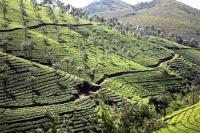Concerns rise as robust flavor of India black tea falls
 Tea plantation in Pambanar, Kerala, India.Hans A. Rosbach via Wikipedia
Tea plantation in Pambanar, Kerala, India.Hans A. Rosbach via Wikipedia
For millions of people around the planet a morning without the strong wake-up call of India black tea is like a day without a smile. Climate change is thought to be the culprit behind the weakening of their favorite morning refresher, black tea also known as breakfast tea, and is likely to force them to start looking for a new picker-upper to put that smile back on their faces. This strong tea acclaimed for it’s hearty, strong taste and hefty body is showing signs of subtle changes and producing what experts are calling weak tea. Grown in the humid northeast region of India, the state of Assam is the prime producer of some of the best black and British-style teas. The unwelcome weakness in the tea has growers concerned. Rajib Barooah, a tea planter in Jorhat, Assam's main tea growing region, also believes that the potent taste and rich flavor of Assam tea has weakened. Tea growers are strongly urging the Indian government to fund studies to figure out if climate change is the real cause for tea plants to weaken and lose their robust flavor. Growers and scientists believe several factors related to climate change are to blame. Over the past 80 years the area’s temperatures have risen 3.6 degrees Fahrenheit (two degrees Celsius), said Mridul Hazarika, director of the Tea Research Association, which is one of the world's largest tea research centers. These same scientists are also researching the causal relationship between temperature rise and fluctuations in rainfall. Added into the mix is the fact that dampness fosters increased attacks on the tea crops by the tea mosquito, which thrives in rainier weather. The insects attack new tea bush shoots, and controlling the tea pests has been made more difficult by restrictions on pesticides because of environmental concerns, Kakaty said.
"We are indeed concerned," he said. "Assam tea's strong flavor is its hallmark."
"Days with sunshine were far fewer during the (monsoon) rains this year," said Dhiraj Kakaty, head of the Assam Branch Indian Tea Association, "leading to a shortfall in production and damp weather unfavorable for tea."
To illustrate how vitally important the tea-growing industry is to India, in addition to exporting nearly a half-million tons of tea every year, the industry also employs approximately three million people across the country



 del.icio.us
del.icio.us Digg
Digg












Post your comment